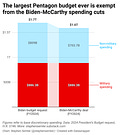House passes the Biden-McCarthy debt limit/spending bill
Speaking Security Newsletter | Note n°207 | 31 May 2023
If you find these notes useful, you can support this newsletter and SPRI, here.
Situation
The Fiscal Responsibility Act of 2023 (H.R. 3746) just passed the House in a 314 to 117 vote. The part of the bill that raises the debt ceiling (Division D) is a little over a page long. The other 97 pages are conditions to that provision that were negotiated by Joe Biden and Kevin McCarthy (R-CA).
As far as the flow of resources is concerned, the most significant of those conditions concerns the discretionary budget — the collection of 12 annual spending bills that Congress must pass every year. Specific amounts for each will be determined later on through the appropriations process, but what the Biden-McCarthy bill does is place strict limits on those appropriations.
The Biden-McCarthy bill
The intent of the Biden-McCarthy bill (what I’m now calling the aforementioned H.R. 3746) is to drive down overall federal spending. To accomplish that, the bill doesn’t just put a lid on total expenditures. It discriminates between two categories of funding: the “security category” which legally refers to Function 050 spending—i.e., money for the Pentagon—and the “nonsecurity category” which is for everything else in the discretionary budget: health care and worker protection programs, economic and social services, medical research, education, civil projects, environment and conservation efforts, etc.
Thanks to the Biden-McCarthy bill, all those initiatives will have $56 billion less to work with in FY2024 than in FY2023.1 Meanwhile, the Pentagon gets $28 billion more, totaling more than $886 billion.2
Bipartisanship
Ever since the terms of the Biden-McCarthy deal were released, much of the conversation has been about who “won” — was it Biden who got the best of McCarthy or the other way around? The answer to that question reveals why it’s the wrong one to ask in the first place. The fact of the matter is that they both won — at the expense of pretty much everyone else.
The bill reflects the bipartisan consensus in Washington. In general, Republicans balloon military spending to crowd out non-military spending; Democrats might resist but ultimately value military spending more. After all, Biden described military spending as “sacred” — he didn’t say that about funding for public health or climate or infrastructure.
What’s displayed below are the amounts Biden requested for each category in his budget request for FY2024 and the spending levels ultimately delimited by the Biden-McCarthy bill. In short, it shows what Biden was and was not willing to give up. For the Pentagon, he proposed the highest (nominal) level of military spending ever; for everything else in the discretionary budget, $809 billion. In the end, Biden got his record-setting Pentagon budget — just at the expense of everything else.
^Alt text for screen readers: The largest Pentagon budget ever is exempt from the Biden-McCarthy spending cuts. This chart has two columns comparing Biden’s budget request and the budget delimited by the Biden-McCarthy spending deal. Each column has two blocks stacked on top of one another, representing military spending and non-military spending. Biden’s military spending request is fully accommodated by the Biden-McCarthy deal — the red blocks each show $886.3 billion. The blue blocks are different sizes. The one in the Biden-McCarthy deal is a lot smaller: it’s only $703.7 billion compared to the $809 billion requested. Figures refer to base discretionary spending. Data comes from the President’s budget request and H.R. 3746.
-Stephen (@stephensemler; stephen@securityreform.org)
Find this note useful? Please consider becoming a supporter of SPRI. Unlike establishment think tanks, we rely exclusively on small donations.
The memo the White House sent to congressional Democrats says that this reduction will be offset through a range of transfers, recissions, and adjustments. The Republicans’ memo doesn’t. My reading of the bill text suggests neither is exactly right. Regardless, I think the GOP will demand further spending cuts during the appropriations process; after all, the allocation for non-military spending in the Biden-McCarthy bill is just a limit — Congress can always decide to spend less than that.
Pentagon spending will likely end up even higher because of a loophole in the Biden-McCarthy agreement. Funding for designated emergencies, including “overseas contingency operations” (like military aid to Ukraine) is exempt from the agreed spending cap, and will simply be piled on top of the Pentagon’s $886 billion ‘base’ budget.



